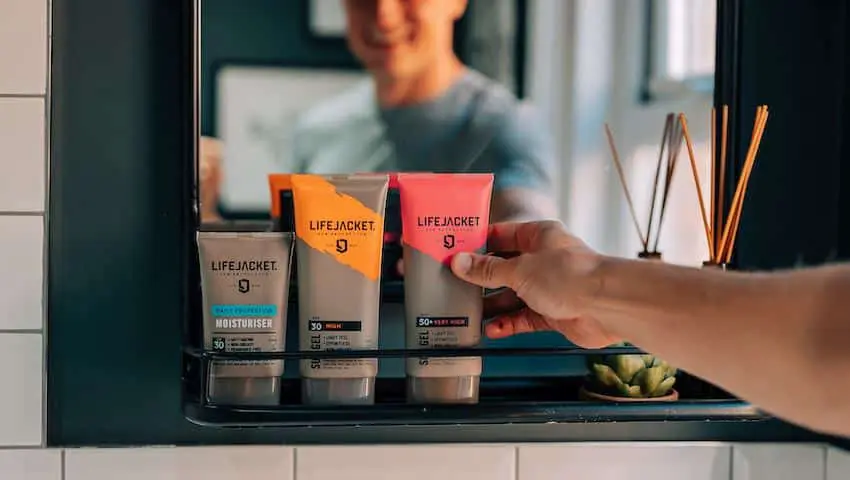Billy Boulos, co-founder of LifeJacket Skin Protection, talks to us about his company and why his sights are set on the bigger picture.
Tell us the story behind your business?
Three of us created LifeJacket after seeing a number of close, male friends experience different cancers at a young age. Jono, another LifeJacket co-founder, was one of them. During this time, we discovered that almost two men die of skin cancer for every one woman. This data point is rarely spoken about, and the World Health Organisation predicts male skin cancer incidence will double over the next 20 years. It’s easy to think you’re invincible in your 30s and 40s but so many young men around us were getting ill, we decided to try and do something about this highly preventable form of cancer.
Our founder-mission is to stop men getting skin cancer but as a brand, we want guys to take life outside and look after their skin while they do it. That’s a far more uplifting and positive manifestation of what we’re trying to achieve.
Our key message focuses on why everyday protection is key. UV is an invisible form of radiation emitted by the sun (and tanning beds). UV-A in particular reaches your skin every single day and in equal measure throughout the year. It even goes through glass. Winter or summer, cloudy or clear, UV causes a range of skin damage from wrinkles through to skin cancer. Putting that into numbers, UV is responsible for 80% of premature skin ageing and 90% of melanoma skin cancers.
What does your role in the company consist of?
In my 20s I worked for an investment bank in the mergers and acquisitions side of the business. I then joined a FTSE 250 alcoholics drinks company where I had several roles across finance, strategy, marketing and sales.
Jono and Rob, the two other co-founders, both worked in the world of cosmetic ingredients and formulation chemistry. At LifeJacket, we all wear multiple hats because we’re a small team, but I would say most of my efforts are focused on brand, marketing and commercial opportunities/partnerships.
What sets you apart from your competition?
To the best of our knowledge, there aren’t any other brands making skin protection products exclusively for men. In trying to get men to protect themselves all year-round, we know we need to remove all excuses men have and address each of their ‘pain points’. Our cosmetic formulations are lightweight, non-greasy, swipe easily through hair and don’t smell of coconuts. We offer UPF 50+ clothing for those who don’t like to constantly apply stuff onto their skin. We sell sachets for those who need portability and all our smaller tubes and Sun Stick have all been designed to be pocket friendly.
In addition, we take detection as seriously as protection and formed a partnership with SkinVision. We offer all our customers something no other brand does. Anybody who buys via our website gets free 7-day unlimited access to SkinVision, a phone app you use to take photos of moles and marks on your skin. The app uses artificial intelligence to compare skin spots and moles with millions of images of known skin cancers. The app then gives you an immediate risk score to help detect problem areas at an early stage and advises if you should seek professional help.
How has business been during the Covid-19 pandemic?
On the one hand, people have been stuck at home and on their phones, so we’ve been able to capture more attention. On the other hand, skin protection is low on people’s list of priorities during a global pandemic, especially when they can’t travel, socialise, exercise or be outside more generally. We’ve kept plugging away and have managed to do well but physical sampling is impossible and several retail opportunities have been closed off.
How do you see your market evolving over the next few years?
Cosmetics ingredients are constantly being scrutinised for their impact on human safety and the environment. This is the regulatory environment we live in. From a consumer perspective, we would hope that male focused media start to talk to men about the damage UV causes daily (just as Vogue et al have been telling women for the past 20 years). This might make men’s SPF moisturisers more of a mainstay/routine product.
What’s the hardest thing about running a business?
Building brand awareness from scratch and constant rejection.
What have been the biggest challenges you’ve faced?
Managing stock is pretty stressful. Having too much is a drain on cash but living with the ongoing risk of being out of stock and managing raw materials/manufacturing (both of which can be on 10-12 week lead times) has been really tough.
What’s the best decision you’ve made so far?
Working with the charity, Melanoma UK.
If you could go back and change one thing, what would it be?
As a direct-to-consumer business, our website is the engine room for everything we do. Each week, it needs to be changed, updated or maintained. I would probably have engineered it differently from the start but unfortunately, you only know what you need once you’re up and running.
What has been your proudest achievement so far?
The positive feedback we get every day on products we’ve made with our ‘own hands’. Each time a customer comes back to buy more, we’re absolutely delighted.
What are your hopes for your business in the next five years?
Our mission is to stop men getting skin cancer. Almost two men die for every one woman. And there’s also a disparity in actual incidence levels between men and women. We’d love to see the graph lines coming down as our message reaches more people, and more men protect themselves daily. With any luck, that should also equate to growth for LifeJacket as a consequence.


